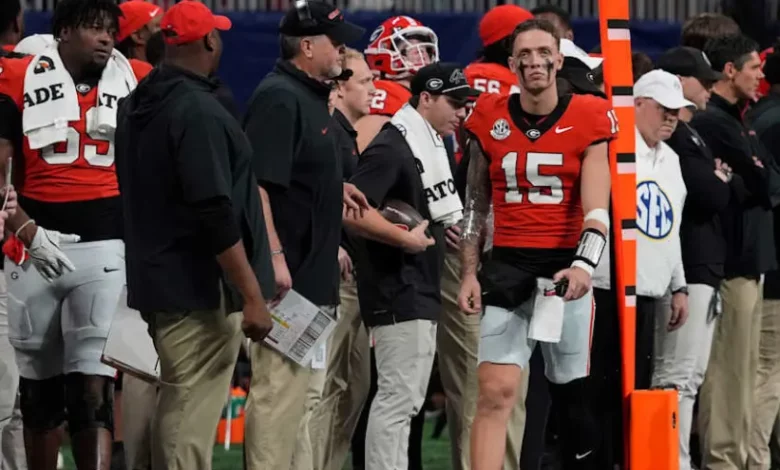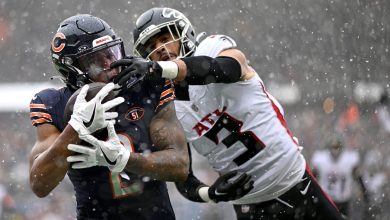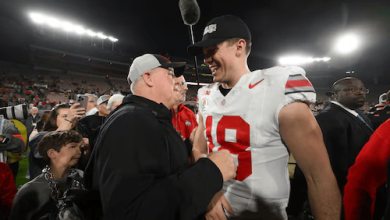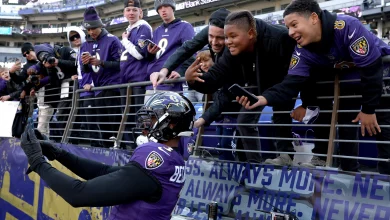An NFL GM calls Carson Beck’s decision to leave Georgia for Miami a “red flag,” questioning his commitment.

In the world of college football, the transfer portal has become a dominant force, reshaping rosters and altering the course of careers for young athletes across the nation. Yet, some decisions still raise eyebrows within the football community, particularly when high-profile players like Carson Beck, a promising quarterback who has been a key figure in Georgia’s rise to dominance, decide to leave one of the top programs in the nation. Recent reports about Beck’s decision to leave Georgia and transfer to the University of Miami have sparked considerable discussion. While many fans and analysts are eager to see what he will accomplish in the next phase of his career, an NFL general manager (GM) has labeled the move a “red flag,” suggesting it could raise serious questions about Beck’s commitment, leadership qualities, and readiness for the NFL.
Beck’s decision to leave Georgia—arguably the most successful college football program in recent years under head coach Kirby Smart—has raised several eyebrows. While transfers are common in college football, the timing and circumstances surrounding Beck’s departure from the Bulldogs have fueled a larger conversation about the state of his career and whether his choice to seek a fresh start in Miami signifies potential red flags for his future prospects.
The Background: Carson Beck’s Journey at Georgia
Before diving into the analysis of Beck’s transfer, it’s essential to understand his journey at Georgia and the context behind his departure. Beck joined the University of Georgia as a highly-touted recruit, hailing from Jacksonville, Florida, where he had already shown immense promise as a dual-threat quarterback. He spent his first few seasons as a backup, biding his time behind one of the most successful quarterbacks in recent memory, Stetson Bennett. While Bennett guided the Bulldogs to a national title in 2021 and led them to another appearance in 2022, Beck remained a promising yet underutilized asset on the team.
By the time Beck was finally expected to take over the starting job in 2023, many believed that Georgia was ready to continue its success with him at the helm. However, despite his immense potential, Beck struggled with consistency, particularly in high-pressure moments. The Bulldogs still found ways to win, but it was clear that the transition from the Bennett era to the Beck era wasn’t as smooth as many had hoped.
Ultimately, the 2023 season didn’t offer the breakout performances that fans had expected from Beck. While he showed flashes of brilliance, inconsistency in key games, combined with the Bulldogs’ dependence on a dominant defense and running game, led to questions about his ability to lead the team into a new era of Georgia football. These questions seemed to grow louder as the season wore on.
After a season in which he didn’t fully capitalize on the opportunity to be Georgia’s full-time starter, Beck made the decision to leave Georgia and enter the transfer portal. His decision to move on to the University of Miami was met with mixed reactions. While some saw it as an opportunity for a fresh start in a new environment, others—most notably the unnamed NFL general manager—questioned whether it was a sign of a lack of commitment to the process of growth, perseverance, and competition. This skepticism about Beck’s ability to thrive at the next level has now become a talking point, casting a shadow over what many once saw as a bright future.
NFL GM’s Critique: A Red Flag for Beck’s Commitment
The comment that has sparked the most conversation surrounding Beck’s transfer came from a highly respected NFL general manager. When asked about Beck’s decision to leave Georgia for Miami, the GM expressed concerns, describing it as a “red flag” that could signal deeper issues with Beck’s mental toughness and ability to handle adversity. In the high-stakes world of the NFL, where quarterbacks are expected to be the ultimate leaders, this kind of critique raises important questions.
“What does it say about a player when they leave a top program like Georgia for a school like Miami, especially after having been handed the keys to the offense?” the GM said. “It suggests that they weren’t able to fight through the challenges, weren’t able to push through adversity, and perhaps they’re just looking for a situation where they don’t have to work as hard to maintain the starting job. That’s a red flag in my book, especially for a quarterback trying to make it to the NFL.”
The comment alludes to a core expectation of NFL quarterbacks: resilience and the ability to face adversity head-on. The journey to becoming an elite NFL quarterback often involves significant struggles, failures, and challenges. It’s not just about talent; it’s about leadership, handling pressure, and sticking with a program through thick and thin. By leaving Georgia after a relatively short stint as the starting quarterback, Beck’s decision might suggest that he wasn’t willing to endure the struggles necessary to improve and eventually succeed, which could signal concerns about his long-term prospects at the professional level.
Moreover, the critique also calls into question Beck’s ability to adapt to the mental rigors of playing at the highest level. NFL teams expect their quarterbacks to show leadership, overcome adversity, and guide their teams through difficult situations. In the eyes of the GM, Beck’s decision to leave Georgia after having a chance to lead the team might point to a lack of those very qualities.
Beck’s Transfer to Miami: A Fresh Start or a Mistake?
From the perspective of Carson Beck, the decision to transfer to Miami could be seen as a strategic move to restart his career in a more favorable situation. After all, Miami is a program in the midst of a major rebuilding process under head coach Mario Cristobal. The Hurricanes have shown flashes of potential but have not reached the level of success they aspire to achieve. For a quarterback like Beck, the opportunity to play at a school where he could immediately step into a starting role might seem like the right path to showcase his talents on a larger stage, especially in a conference like the ACC.
However, even if Beck’s decision is driven by the desire to be in a more quarterback-friendly environment, the timing and circumstances surrounding his departure from Georgia leave questions unanswered. Why, after several years of grooming and development, did Beck choose to leave one of the most prestigious college programs for a Miami team still trying to find its identity? If his goal is to prove himself in the NFL, wouldn’t it have been more prudent to stay at Georgia and fight for the job—especially given the history of success that Kirby Smart has had with quarterbacks?
This question speaks to the dilemma facing many young players today in college football, particularly quarterbacks. In an era of instant gratification, many players seem eager to switch programs in pursuit of playing time and greater opportunities. However, in the case of Beck, his decision may represent an attempt to bypass the necessary steps of growth and development required to succeed at the highest level.
In reality, Beck may well find success at Miami, and his decision could ultimately prove to be the right one. But the concerns raised by the NFL GM cannot be ignored. Professional football teams are looking for quarterbacks who are not only talented but also mentally tough and capable of handling adversity. While Beck may thrive in his new environment, the question remains whether he has the resilience required to overcome setbacks and emerge as the player he was expected to be.
What This Means for Beck’s NFL Prospects
While many have been quick to label Beck’s transfer as a fresh start, it’s important to understand the potential impact on his NFL prospects. NFL teams typically value quarterbacks who are not only skilled on the field but also resilient off the field. A quarterback who can weather the storms of adversity, fight for his spot, and lead a team through challenging times is highly prized.
Beck’s decision to leave Georgia for Miami could be seen as an indication that he might struggle with adversity at the next level. If NFL teams view his departure as a sign of weakness or a lack of perseverance, it could hurt his draft stock. Moreover, given that Beck was part of a national championship-winning program, teams might question why he couldn’t rise to the occasion when it was his turn to lead.
However, it’s also possible that Beck’s move to Miami could give him the chance to rebuild his reputation and prove his doubters wrong. A fresh start could provide him with the opportunity to showcase his talents in a new offense, with new teammates, and a fresh slate. If Beck thrives at Miami, it could serve as a redemption story, proving that he is capable of handling challenges and excelling in new environments.









